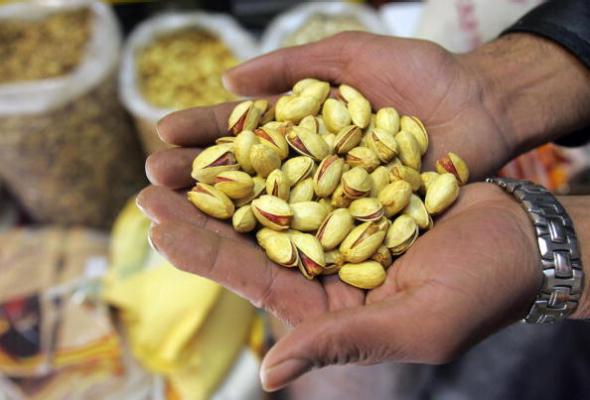The nuclear development agreement announced Tuesday between Iran and six world powers, including the U.S., is a historic development in world diplomacy. But how will it affect the pistachio market? Let’s go to the text.

Screen shot/Vox

Screen shot/Vox
Caviar, rugs, and pistachios are signature Iranian products that have been specifically targeted by various U.S. actions through the years since the Iranian Revolution. The lifting of certain trade-related sanctions was the major carrot that the U.S. and its partners were holding out to Iran during negotations; if Tuesday’s deal proceeds as planned, the agreed-upon sanctions will come to an end in early 2016 and Americans will be able to get their hands on those products. (Not every U.S.-Iran trade sanction is related to Iran’s nuclear program, which means that not every sanction will be lifted—oil imports still won’t be allowed, for example.*)
I have no idea how many Americans will rush out to buy Iranian caviar or carpets—I’m guessing it’s a small number. But who doesn’t love a good pistachio? So I wondered: Is Tuesday’s news a big deal for the average American nut consumer? I reached out to Nuts.com CEO Jeff Braverman, who I once sat next to at a wedding, to get his take on the news. Jeff passed along comment from his uncle Sandy Braverman, who has worked in the nut business since the 1950s. Wrote Sandy:
“Years ago the majority of pistachios came from Iran. They were big and round and had a great nutty flavor. I believe they were the sert variety. The largest size was a 16-18 or a 14-15, which is a really big nut. And you really couldn’t eat just one. They were that good. Much nuttier taste. There were Turkish pistachios around, but they were small and hard to open. However, they had great taste if you were willing to work to get them open. After the trade embargo with Iran, the California pistachio became the dominant product in the U.S. They looked great, easy to open, but to pistachio connoisseurs they tasted like cardboard. The only way you could get the Iranian was to go overseas. There was even a 300 percent duty before the current sanctions, I think starting around the hostage crisis. If they allow the Iranian pistachios in the country it may take a real bite out of the domestic market as they are far superior.”
Added Jeff: “We like to separate politics from business, but if our government green lights it and we feel it is ethical to sell Iranian pistachios, then we will.”
Even with sanctions in place, Iran has in recent years been the world’s largest producer of pistachios—per Bloomberg, the nuts are the country’s second most valuable export after oil. And if you believe Sandy Braverman, Iran might just be about to crack the United States market big-time.
*Correction, July 15, 2015: This post originally misstated that U.S. oil companies will be allowed to invest in Iran after sanctions are lifted. That does not appear to be the case.
